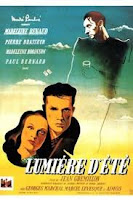September 21, 2019
Lumiere D’ete –
France, 1943
About a quarter of the way through Jean Gremillion’s Lumiere D’ete, I had a strong sense of déjà
vu, and in an instant, I was flooded with memories of that American paradise
formerly known as 90210 and an
episode in which a new girl arrived at the gang’s high school and immediately
piqued the interest of Brandon, Dylan, and David – the latter even dedicated a song
to her on the school’s intercom/radio station. Soon the most pertinent unknown
was just whose heart would remain intact by the time the closing credits began
to roll.1
Lumiere D’ete is
not 90210, yet it feels more similar
to it than you’d expect – at least the second half of it. The first half – the half
I appreciated a lot – plays much more like something from the mind of David
Lynch. The film is set in a remote mountainous region of France that is in the
process of joining the 20th century. There, cars drive side by side
horse-and-buggies, and a lavish hotel, tellingly named “Guardian Angel,” feels
wholly out-of-place. Early on, the hotel seems like a refuge for outcasts and
oddballs. For example, one male resident is working on an editorial advocating
for the removal of the Eiffel Tower; another woman has been divorced several
times and seems as if she uses the hotel as a means of avoiding any further romantic
disappointments. There’s even a wealthy patron who has a very unhealthy
relationship with the owner of the hotel, and then there’s a particular
construction worker who has an odd obsession with a bird. So, yeah, Definitely
Lynchian territory.
Into this sea of eccentricity steps Michele, a young woman
vacationing with her actor-interior designer boyfriend – at least she will be
if he ever shows up. The other guests seem genuinely surprised by her arrival. “Who
in their right mind,” they seem to be thinking, “would come to this place?” The
woman’s arrival is noticed immediately by the wealthy patron, Patrice (Paul
Bernard), and one of his first acts is to have sunflowers sent to her room.
Later, we are introduced to Julien (Georges Marchal), a young engineer who is
mistaken for Michele’s boyfriend and given access to her hotel room. She greets
Julien with a huge kiss before realizing her mistake, and being the gentleman
he is, he recognizes the error and leaves to get another room. It’s too late,
though. Cupid’s arrow has already struck. The final member of this four-sided
affair arrives shortly after, inebriated, disorderly, bruised from a minor motorcycle
accident, and emotionally crushed by bad reviews and the public’s rejection of
his latest play.
So, all the players are now in position, and like the 90210 episode, we are left to wonder just
who Michele will ultimately end up with. However, if you think about it, there’s
really no mystery at all. The boyfriend is a louse who incessantly refers to Hamlet in that exasperating way that
only Shakespearean actors in movie do; the rich man is an obsessive oddball who
has a slight psychotic streak; and the last one is romantic, but adopts the
personality of a jerk. If these choices all sound unappealing, remember that
old cinematic troupe regarding jackasses, and you’ll correctly predict the film’s
closing frame.
The second half of the film includes a long costume party
that boggles the mind. Up until then, the film leads you to believe that this
is a fairly isolated area far from the modernities found in Paris. Yet suddenly
everyone can get their hands of lavish expensive costumes, and people start
arriving in droves, so many that I began to question my earlier assessment of
the owner of the hotel. For the first half of the film, the area’s isolation
made it understandable that she continues to cling to a relationship that is increasingly
less rewarding, yet when confronted with the plethora of men who flock to the
party, one has to wonder why she doesn’t just let him go and try her luck with
one of them?
I suppose I could praise the film for its impressive
cinematography, as there are a number of stunning shots of the French mountainside
and areas under construction. I could also laud the impressive work of Madeline
Robinson, who makes Michele both authentic and sympathetic, and Madeline Renaud
for her intriguing portrayal of Cri-Cri, the owner of the hotel. But if I’m
honest with myself, these, as well as the amusing quirkiness of the first half,
are all I can really recommend of the film. Were it about naive teenagers who
mistake lust for love and obsession for adoration, the film might work; in its
present form, though, I have to admit, it’s nothing but melodramatic poppycock.
(on DVD as part of Criterion Collection’s Eclipse
#34: Jean Gremillon During the Occupation)
2 stars
*Lumiere D’ete is
in French with English subtitles.
1If memory serves me, the show ended with the
girl singing a song at some musical event and turning down both Brandon and
Dylan.


No comments:
Post a Comment